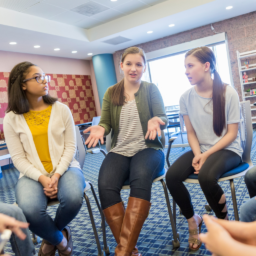By Joy Waelend and Marianna Nicolaou
At this crucial time, children and young people need to have their voices heard more than ever. Over the past year, the effect the Covid-19 crisis has had on adults has been highlighted heavily, whereas we rarely hear about the implications for children and young people, from a young person’s perspective.
As restrictions begin to lift, it has been reported that Britain is now facing a ‘mental health crisis’ with new analysis revealing that 400,000 children sought help for mental health problems as a result of the pandemic. While people of all ages have been negatively affected over the last 12 months, children and young people have been found to be particularly susceptible.
We all know that services pre-pandemic were overrun and caseloads were at an all-time high and now there is agreement that since COVID this situation has only worsened, with more services – and professionals – under increased strain.
As part of our service delivery we, like many other professionals, have had to change our way of working. From being a service which ran predominately through face-to-face delivery, we have taken a 360 degree turn into the virtual world. There is some evidence that young people’s voices are being heard more in this new virtual world and therefore we need to identify how we retain these practices in the post-pandemic world.
As humans, sometimes we can listen, but we don’t hear, or we hear and we don’t listen. Historically, children were taught to be “seen and not heard” but without listening, we cannot assume that we understand their needs, requirements or concerns. For many children and young people, there can be several other factors affecting their behaviour and so it is important to get beneath the surface to understand the wider issues and provide the right response.
We’re passionate about ensuring children have a voice and this runs through our work on independent visiting, advocacy and participation. Our service is focussed on obtaining the views of children and young people. We all understand the difficulties faced when speaking to young people over the phone or through a video call, however, with persistence, consistency and the foundation of a positive relationship, we have achieved engagement with at least 80% of our service users virtually. During the pandemic we, like everyone, worked differently and what we have learnt is by keeping in touch with young people, this empowers, encourages and supports positive mental health.
Our Children in Care Council workers have worked closely with a group of young people throughout lockdown to ensure their voice is being heard and that we understand the effects it was having on them.
Our Independent Visitors (IVs) have also been invaluable; they play a vital role in a young person’s life. The pandemic has meant young people have had limited contact with their support network, such as friends and relatives, and so our focus has been on ensuring this has been maintained. Young people are now bored of phone calls and because of this we have delivered Zoom training to our IVs and implemented age appropriate session plans. Virtual sessions have included Bake Offs, movie nights, quizzes, treasure hunts and even virtual escape rooms.
Sometimes, in our work to listen to children and young people, we have to find different and creative ways to do this. This could be because they are select mute, non-verbal or SEN and so listening is not always about what people say, but how they choose to communicate in their own way, such as via body language. A young person is always telling us something, the question is, are we always listening?
The truth is, there is never a situation where we shouldn’t be listening. Indeed, there aren’t any circumstances we can think of where a situation has been made better by not listening to what a child or young person has to say. Shutting them down is inappropriate. The VR films we develop here at Antser show that young people need a voice and showcase the potential resulting situations that can arise when they haven’t had that opportunity.
The voices of our young people, whether they be big or small, are so significant in how we shape our work and practices. By listening it has helped us to deliver our service in a more dynamic and focussed way, which has enabled us to maintain our positive contact with young people.
All we need to do is listen.


